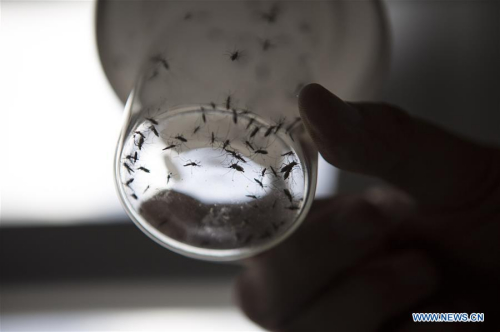
Image taken on Feb. 17, 2016 shows Dr. Juan Garcia, director of the Center for Parasitological Studies and Vectors (CEPAVE) of the Faculty of Natural Sciences of La Plata National University, holding a bottle with Aedes aegypti mosquitoes sheltered for study at one of the Centre laboratories, in La Plata city, Argentina. (Photo: Xinhua/Martin Zabala)
Australian scientists have moved a step closer to preventing the spread of Zika virus, after they exposed mosquitoes to bacterium that could limit the ability of the virus to be transmitted to humans.
The "super-infected" mosquitoes were exposed to two strains of Wolbachia, a bacterium which traditionally reduces the risk of dengue fever spreading to humans, but scientists from the University of Melbourne have said new applications could help reduce the risk of humans contracting the Zika virus.
Prof. Cameron Simmons from the university's Peter Doherty Institute said while the Wolbachia mix was proven in preventing the spread of dengue, it could be some time before researchers are able to restrict the spread of Zika, which has no known cure and has spread rapidly throughout South America and Asia.
"(Zika) would be a higher hurdle for the virus to get over the top of," Simmons told the Australian Broadcasting Corporation (ABC) on Friday.
Testing the effectiveness of the Wolbachia is expected to take part in Latin America, Indonesia and Vietnam early next year, and Simmons said he expects the Wolbachia to perform similarly to how it does against dengue.
He said laboratory evidence has suggested that Wolbachia could also slow the spread of other viruses carried by the Aedes aegypti mosquito, including chikungunya and yellow fever virus.
Previous studies undertaken by the institute found the ability of a virus, in previous cases, dengue, to spread throughout the Wolbachia-infected insect's tissues was "limited".
Simmons said the Wolbachia prevents the virus from passing through the mosquito's salivary glands, and therefore, prevents it from being spread to humans.
"It's a dead end essentially for the virus," Simmons said.
"The Wolbachia stops the mosquito being able to onward transmit the virus to a human host."


















































